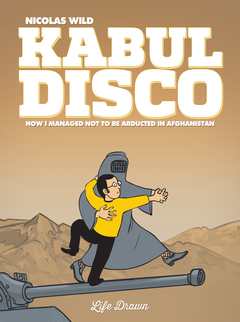
By Nicolas Wild, translated by Mark Bence & Fabrice Sapolsky (Life Drawn/Humanoids Inc.)
ISBN: 978-1-59465-868-6
Fiction and reality frequently blur, but stories – True, mostly True, totally True or Officially Confirmed by a Government Official and therefore Utterly Fallacious – told in comics form somehow always acquire an instant edge of veracity and patina of authenticity that is hard to dispute or refute.
Kabul Disco is a superb case-in-point: an example of sophisticated yet simple Euro-cartooning designed to charm and challenge in equal amounts. It is also the initial release of trans-Continental publisher Humanoids’ new Down-to-Earth, Real-World graphic novel imprint Life Drawn.
This fabulous monochrome travel memoir is the debut episode in a sequence by French writer/artist Nicholas Wild and details his globe-trotting quest for employment: a worthy endeavour which took the wide-eyed political innocent to Afghanistan in 2005.
Remember This: there’s always a war going on somewhere. That’s just the way it is. The enemy are always monsters and our side – there’s no leeway to not take sides anymore – are always justified in what they do. Heaven forfend if you slip up and start thinking of rivals or adversaries or opponents or even those who disagree with you as no more than people – with or without grievances or differing opinions…
In January 2005, Wild was in Paris; gripped by ennui and lack of inspiration and only mildly galvanised by lack of money and imminent homelessness. Responding to an online ad he applied to a Communications Agency looking for a comics artist and was astounded to find himself accepted for a short commission. The job was overseas…
‘Part One: A Winter in Kabul’ follows the culture-shocked scribbler as he arduously transitions to a country in the throes of enforced reconstruction and modernisation, joining the somewhat sketchy and rather dubious NGO Zendagui Media as they work to bring the war-torn region into the arena of modern nations.
Wild’s proposed task is to help define the fancy notion of democracy for the still-largely illiterate populace through comicbook versions of Afghanistan’s new Constitution…
The artist’s early difficulties in adjusting to the primitive conditions and superb gift for wry commentary then afford the reader a brilliant example of the complex made simple as Wild succinctly unpicks Afghanistan’s convoluted history through the 20th century via a cartoon political primer that brilliantly defines how the place got to be such a corrupt mess. I certainly wish I’d had more comics like this when I studied modern history…
Days pass and Nicholas settles in, toiling against impossible deadlines, conversely feeling locked in or anxiously exposed whenever he goes exploring; always aware that in this place foreigners go missing every day…
Although the security situation remains tense, trouble seems to only strike elsewhere and eventually Nick assimilates: befriending ordinary Afghanis, shopping, visiting Shiite mosques, eating in restaurants and even sightseeing in the stunning Bamiyan Valley…
All too soon the job is done and Wild is afraid he’s going to be let go…
‘Part Two: No Spring in Kabul’ finds Wild on April 1st 2005, happy to be retained, albeit on a 3-month contract as a graphic designer for Zendagui’s new project. The brief is to supply materials for a US military-sponsored push to recruit native Afghanis for the new National Army. The thought of crafting military propaganda is not a comforting or comfortable one…
Spiced with further insights about his improbable and unpredictable bosses and new eating experiences, the real kicker is meeting new recruit Laurie White: a political communications expert who worked with the 2000 Bush Election Campaign…
Trips to the University of Herat and enjoyable days amidst the villagers soon cement the visitor’s sense of belonging but that all takes a hard knock as the political situation intensifies and overconfidence leads to Wild getting lost in old Kabul…
When a fresh kidnapping results in a full lockdown for Zendagui staff, Laurie teasingly reveals the true story of Bush’s “victory†in Florida but once the panic subsides it’s back to work. Even though Al Qaeda and the Taliban are ramping up their activities, Nick is sent to the far end of the Jalalabad Road to observe the filming of a recruitment ad even as Laurie is despatched to consult on the new voting form for a nation of more than two dozen different tribes and sects who don’t speak the same language and can’t read…
And so it goes, with fond reveries and razor-sharp observations peppering Wild’s irresistible account of an ordinary job in extraordinary times and a magical place: with idiocy and contradiction piling up but progress somehow being made until it’s time to go home again…
But is it for good?
Although rendered in beguiling black and white, Kabul Disco also provides a stunning, full colour ‘Bonus Section’ comprising candid personal photographs of Wild’s stay, plus extensive examples of Yassin & Kaka Raouf: the 10-volume educational comicbook he illustrated to explain the new Constitution for the newly democratised country.
Captivating, warm, funny, scarily informative and unobtrusively polemical, Kabul Disco is a wittily readable, non-discriminating reverie that informs and charms with surprising effect: the perfect response to the idiocy of war and dangers of corporate imperialism as well as a sublime tribute to the potent indomitability of human nature. I can’t wait for the second volume scheduled for later this year – although I’m just going to have to.
Moreover, the quality of this book augers exceedingly well for Life Drawn’s other imminent releases (Vietnamese Memories: Leaving Saigon by Clément Baloup; Louisa: Now and Then by Carole Maurel &‎ Mariko Tamaki; Madame Cat by Nancy Peña): a barrage of personal stories certain to challenge any comics fan’s definition of fantastic fiction and true-life drama.
© 2018, Humanoids Inc., Los Angeles (USA). All rights reserved. First published in France as Kabul Disco Tome 1: Comment je ne me suis pas fait kidnapper en Afghanistan, © 2007 La Boîte à Bulles & Nicholas Wild. All rights reserved.
